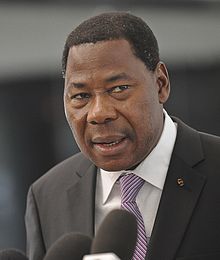Simisola Oloye of the Faculty of Pharmacy, University of Ibadan, is the best graduating female student of the 2017/2018 set, with a Cumulative Grade Point Average of 6.7 out of 7. She speaks with Laolu Harolds about her experience through school, and plans for the future
By Laolu Harolds
pharmacy Share
If you qualified to study Pharmacy at the University of Ibadan, you could as well have gone in for Medicine and Surgery. Was that what you were given, or is that where your heart really is?
Growing up, I had always wanted to be so many things, including being an Astronaut. While in secondary school, I wanted to study Engineering in the university due to my love for Mathematics, Physics and Chemistry. However, being the best student in my class, my teachers expected that I should put in for Medicine and Surgery. Doing something health-related didn’t seem like a bad idea to me, but I knew I didn’t exactly enjoy Biology, so Medicine and Surgery wasn’t a fit for me. I later spoke to one of my teachers and he counselled me and gave me career options, Pharmacy inclusive. I did my research and when I found out what the profession entails, I knew it was a fit for me. So, I put in for Pharmacy at the University of Ibadan, met the cut-off and I was admitted.
A final CGPA of 6.7 out of 7 couldn’t have happened suddenly. Did you set this as a goal right from the start? And how easy was it staying on track?
I started out after 100 Level with a CGPA of 6.9 and, honestly, I didn’t plan it or even see it coming. It was basically science courses (chemistry, physics, mathematics, etc) that we took in 100 Level; and it was pretty easy for me. Pharmacy school was a new ball game entirely. We started taking pharmaceutical science courses and it was very challenging. However, I made up my mind to be consistent and to study hard. I set goals every start of each semester. I would list out all the courses I would be taking and the prospective scores I wanted to achieve in them. Even though I didn’t eventually get those exact scores, most times I would get something really close to what I had written down. This helped condition my mind and study pattern. 300 level was exceptionally challenging for me; I had my lowest grade point average that session. However, I didn’t give up. I worked harder in my penultimate year and also in my final year.
Young people these days are addicted to their phones, especially girls. How did you manage to insulate your academic progress from the disruptive influence of social media?
People that know me so well know that I’m almost always on my phone. I’m an indoor person, so being on social media is the major way I socialise and keep up with people and things around me. However, I understood that there had to be a balance. Even the Bible instructs us on moderation and there being a time for everything. I understood that. It took discipline and self-control to reduce my social media activity when I had to.
Did you socialise? If you did, how much, and how did you protect your academic progress from being affected?
I’m not exactly a very social person. I barely went to parties and all. I was a leader in my fellowship in school, Christian Fellowship international (CFi). Also, in pharmacy school, we usually ran classes and labs from 8am till 6pm every day. So, for me, my routine was basically from my hostel to class to fellowship and back to my hostel. Even my weekends were not exactly free.
However, whenever I could, I found time to go to the movies with friends and just hung out. I was also involved in some PANS (Pharmaceutical Association of Nigerian Students) activities. Once in a while, I’d attend some social conferences organised in school or in Ibadan.
The key for me was ‘balance’. I was able to do all these and at the same time not let my academics suffer.
Studying science, I’m told, is expensive, and being a female comes with its own demands, financially. Did you have everything you needed or how did you cope?
I didn’t have everything I wanted, but I definitely had what I needed. My parents were super supportive financially. Whenever I called home for money, they would always find one way or the other to supply it. Also, my elder sister contributed her own quota financially.
I was fortunate to be a recipient of the NNPC/Chevron JV Scholarship, and that went a long way financially as well. Once in a while, whenever I was chanced, I used my skill (hair and wig making) to make some extra cash.
What do your parents do? And how would you say they have influenced your academic progress so far?
My dad is retired and my mum is into clothing business. My parents challenged me a whole lot. Whenever I sent my previous session’s result to my dad, he would always question any grade that was below ‘A’ (of course in a loving way). This helped to frame my mindset to always aim at achieving ‘A’ in all my courses. It pushed me to always do better also.
My mum also supported me immensely by encouraging me and always praying for me. She would tell me how elegantly she wanted to be dressed on my induction day into the profession, and how proud of me she would be. I didn’t want to disappoint them, and that was one of my driving forces. By God’s grace, I made them so proud on my induction day.
What form of challenges did you have to grapple with along the way?
Pharmacy school was really challenging. However, I always had a victorious mindset. The stressful hours of classes and labs, writing lab reports, doing numerous assignments, meeting up with deadlines, staying sane amidst all of the rigors of pharmacy school….. All of these weren’t exactly easy.
I’m a person of faith and I never lacked comfort and encouragement. I walked triumphantly by the grace of God through all of the challenges having that mindset. Also, I had an amazing support system. Most of my friends were in the same class with me, so we studied together, we cried together, we encouraged one another, we helped one another, we did revisions together, we played together, we prayed together and all of that. My friends are truly the best.
I also had mentors that I could always confide in for support when things seemed overwhelming.
Can you tell us what study pattern, what discipline worked for you through your course?
I’m almost a perfectionist. I always plan how I do my things (including reading) before I do them. I tried as much as possible not to procrastinate and also to ensure that other aspects of my life did not suffer at the hands of my academics. I always aimed for balance. I observed the times I assimilated better (between the hours of 2am to 6am), so I utilised these hours judiciously. I tried as much as possible to cover all in the course outline before exams to avoid crash reading. I utilised mnemonics a lot, as they helped me remember a lot of things during exams. I ensured I always had at least six hours of sleep (four hours during exams) everyday to avoid breaking down as this happens to quite a number of people during exams in pharmacy school.
What do you plan to do next?
After my internship, I’ll proceed for the mandatory national youth service. After that, I hope to go for my master’s degree programme and study maybe even up to doctoral level. I have strong interests in research and innovation. The aspects of pharmacy that catches my fancy are the industry and the academia. Sometime in the future, God willing, I hope to own a pharmaceutical firm in Nigeria.











